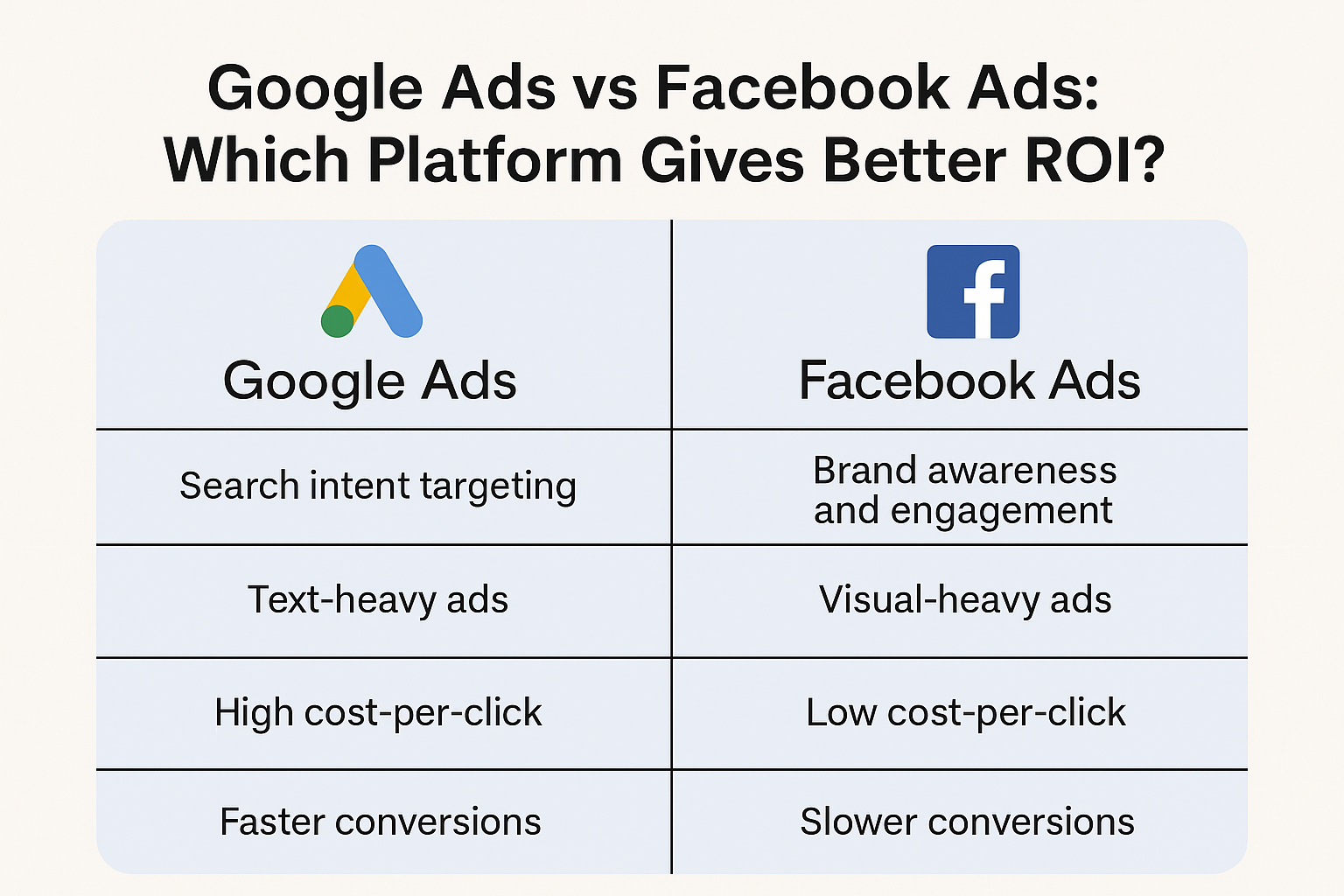Introduction
In 2025, paid advertising is one of the most powerful tools for business growth. Two leading platforms are Google Ads and Facebook Ads. Both offer massive reach and targeting options, but the big question is — which one gives better ROI?
This blog will help you understand the key differences between Google Ads and Facebook Ads so you can choose the best platform for your business goals.
What Are Google Ads
Google Ads is a pay-per-click (PPC) advertising platform where your ads appear on Google search results, YouTube, Gmail, and partner websites. It focuses on keyword-based targeting and reaches users who are actively searching for something specific.
Best for:
- Local businesses
- Service providers
- High-intent searches
- Lead generation and conversions
What Are Facebook Ads
Facebook Ads lets you promote your products or services on Facebook, Instagram, Messenger, and other platforms within Meta’s network. It focuses on interest and behavior-based targeting to reach users while they scroll through social media.
Best for:
- Brand awareness
- Product promotion
- Community building
- Visual storytelling
Main Differences Between Google Ads and Facebook Ads
| Feature | Google Ads | Facebook Ads |
|---|---|---|
| Platform Type | Search engine-based | Social media-based |
| Targeting | Keywords, location, device | Interests, demographics, behavior |
| User Intent | High (active searchers) | Low to medium (passive browsing) |
| Ad Formats | Text, display, video, shopping | Image, video, carousel, stories |
| Cost-Per-Click (CPC) | Higher average cost | Lower in most cases |
| Speed of Results | Fast if search intent is strong | May need more time to convert |
ROI of Google Ads
SEO Keyword: Google Ads benefits
Google Ads provides a strong return on investment, especially for businesses that rely on immediate customer action. Since users are actively searching for solutions, they are more likely to click and convert.
Pros:
- High-quality traffic
- Fast results for local and service-based businesses
- Detailed tracking with conversion tools
- Great for lead forms, product searches, and booking services
Cons:
- Higher competition
- Requires continuous budget and optimization
ROI of Facebook Ads
SEO Keyword: Facebook Ads advantages
Facebook Ads offer a more affordable way to reach large audiences, build trust, and create demand. While the conversion may take longer, it’s great for building long-term relationships with your audience.
Pros:
- Lower cost per impression
- Great for retargeting and awareness
- Visual content helps brand recall
- Works well for product launches and events
Cons:
- Lower buying intent
- Requires creative content to perform well
Which Platform Should You Choose
Choose Google Ads if:
- You offer services people actively search for
- You want leads or bookings quickly
- You have a clear set of keywords and landing pages
- You’re in health, education, legal, or professional services
Choose Facebook Ads if:
- You want to create brand awareness
- Your product or service is visual or emotional
- You’re promoting fashion, lifestyle, or events
- You want more affordable traffic and engagement
Using Both for Maximum ROI
Many successful businesses use both platforms together:
- Use Facebook Ads to build awareness and collect leads
- Use Google Ads to retarget and convert users actively searching
Combining both helps cover the full marketing funnel — from discovery to purchase.
Final Thoughts
Both Google Ads and Facebook Ads offer excellent ROI, but in different ways. Google is better for direct conversions and intent-driven users, while Facebook shines in building long-term engagement and cost-effective awareness.
The right choice depends on your industry, budget, audience, and goals. In many cases, using both platforms together gives the best return and helps your business grow faster.
Frequently Searched Keywords
- Google Ads vs Facebook Ads for small business
- Which ad platform gives better ROI
- Facebook Ads or Google Ads for local business
- Digital advertising comparison 2025
- Benefits of using Facebook Ads
- Return on investment from Google Ads

